Text
Black TV Shows & BGLOs
In 2020, the United States is finally confronting its issues with racism in society as well as the entertainment industry. With that, there has been a surge in black content on various streaming platforms.
Television shows with predominantly African-American casts often feature a glimpse at special pockets of black culture. One pocket often featured is the cultural experience of pledging historically black fraternities and sororities, otherwise known as Black Greek Letter Organizations (BGLOs). The five fraternities and four sororities that comprise BGLOs, affectionately called “The Divine Nine,” are officially known as the National Pan-Hellenic Council (NPHC).
Feature films tend to focus either on stepping, as with Stomp The Yard and Step Sisters, or the issue of pledging vs. hazing, as with School Daze and Burning Sands. Black sitcoms and other small screen productions, however, tend to explore BGLO issues with more nuance and humor.
A Different World - Ep. #216 - “It’s Greek to Me” - 1989 - NBC
Hillman College best friends Dwayne and Ron are in the midst of pledging fictional fraternity Kappa Lambda Nu. As time goes on, Dwayne becomes disillusioned with the process and argues with Ron over whether what they’re enduring is worth the benefits of the frat. Dwayne eventually drops line while Ron crosses into the brotherhood, and they see that their friendship can survive different paths. The matter is handled amicably and respectfully, and Ron is seen in future episodes as an active member.
Season 2 is when A Different World found its identity within the HBCU experience, as Debbie Allen took over the direction of the series after Denise’s character departed. Debbie and sister Phylicia Rashad are both Howard University alumnae, and Phylicia is a member of Alpha Kappa Alpha.

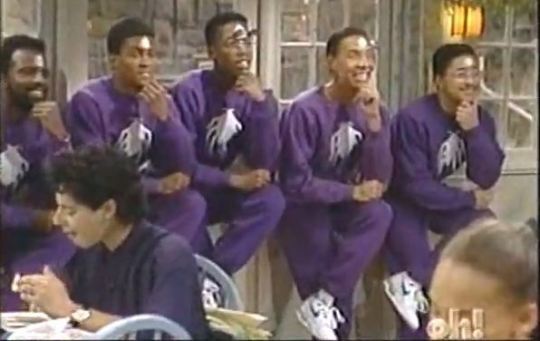
A Different World - Ep. #421 - “Sister to Sister, Sister” - 1991 - NBC
Though no episodes depicted Whitley pledging, in this one Whitley oversees Kim’s pledge process for fictional sorority Alpha Delta Rho. Like its predecessor, the episode questions the pledge process itself, and further, the ethics of whether someone should pledge a friend. While Whitley defends her actions, Kim ultimately gets revenge when she over-seasons Whitley’s eggs with pepper. Whitley realizes she was being harder on Kim because they were friends, and learns how to be a better sister overall.


You can watch A Different World with a subscription to Amazon Prime Video.
The Fresh Prince of Bel-Air - Ep. #408 - “Blood is Thicker Than Mud” - 1993 - NBC
Once Will and Carlton matriculate to University of Los Angeles, they decide to pledge fictional fraternity Phi Beta Gamma. However, things take a turn for the worst when Will finds out he made the cut, but Carlton didn’t because he doesn’t “fit their image.” When Carlton finds out the truth, he reads them for filth in an iconic speech that defends his authenticity. There is no mention of the fraternity in the rest of their college experience.

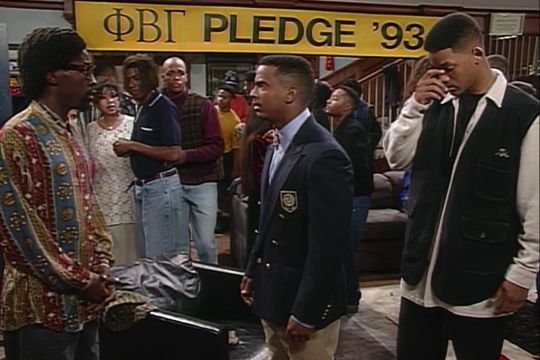
You can watch The Fresh Prince of Bel-Air with a subscription to HBO Max.
Moesha - Ep. #224 - “Prom Fright” - 1997 - UPN
The episode begins with Frank reminiscing about Kappa Alpha Psi with his frat brother, complete with cane twirling and chanting, “I'm pretty on my left, I'm pretty on my right, I'm so damn pretty I can't sleep at night!” Frank believes his frat brother’s Harvard-bound son would be a good fit to date Moesha as an alternative to Q, but later finds out the boy isn’t interested in Kappa or anything Frank had hoped for. The boy even says he isn’t interested in organizations that perpetuate a “herd mentality,” a rarity in depictions of children with parents in BGLOs.
Moesha - Ep. #401 - “Moesha Meets Brandy” - 1998 - UPN
There is no discussion about Greek life in this episode, however, Moesha’s new college boyfriend Aaron and his frat brother show up wearing Kappa Alpha Psi shirts for their weekend trip to Big Bear.
Moesha - Ep. #407 - “A Terrible Thing Happened on My Tour of College” - 1998 - UPN
Moesha and her friends take a campus tour for prospective student weekend of Maynard University. Part of their introduction to campus is a step show featuring Omega Psi Phi, Kappa Alpha Psi (and Moesha’s ex Aaron from #401), and Delta Sigma Theta. This episode centers on Moesha grappling with the betrayal of a college student named Melvin drugging her drink at a college party, but thankfully Aaron comes to her rescue.
One of the writers on Moesha was Mara Brock Akil, who pledged Delta Sigma Theta at Northwestern University.
You can watch Moesha with a subscription to Netflix.
Sister, Sister - Ep. #608 - “Greek to Me” - 1998 - The WB
Like the transition from ABC to The WB, the show saw Tia and Tamera transition from high school to University of Michigan. As the twins are exposed to Greek life, Tamera finds her anniversary dinner plans interrupted when Jordan goes undercover for student newspaper to investigate hazing. Meanwhile, Ray tries to convince Tia to pledge Alpha Kappa Alpha, while Lisa tries to sway her towards Delta Sigma Theta.
Lead actor Tim Reid wore an Alpha Phi Alpha sweatshirt in this episode, as he pledged the fraternity at Norfolk Stage College.
You can watch Sister, Sister with a subscription to Netflix.
The Parkers - Ep. #101 - “Grape Nuts” - 1999 - UPN
As Nikki and Kim start Santa Monica Community College, they also decide to pledge the fictional Alpha Alpha Alpha, or “Triple A’s.” As they continue in the pledge process, however, Nikki becomes increasingly fed up, which leads her to tell off the sorority sisters. She drops the line while Kim goes on to cross.
This is a rare depiction of a mother and daughter on the same line, as well as an extreme age gap in pledges for a collegiate one.


The Parkers - Ep. #404 - “Meter Maids Need Love, Too” - 2002 - UPM
Kim and Stevie are troubled by three ex-cons pledging their same sorority. Meanwhile, a fictional fraternity pledge bothers Professor Oglevee and T. While some sororities have clauses against criminal records, this is a rare depiction of one in which women who’ve traded prison for college are able to participate.
You can watch The Parkers with subscriptions to Netflix and YouTube TV.
Girlfriends - Ep. #616 - “Game Over” - 2006 - UPN / The CW
The show’s transition from UPN to The CW coincided with Joan’s transition to “It Girl” with the success of her restaurant The J-Spot. In this episode she mentions that she will be honored at a gala for business women thrown by Delta Sigma Theta, and needs to ask one of her potential suitors to be her date.
With this show being set post-college, this reference is a reminder that sororities and fraternities continue to be involved in their communities well beyond the collegiate pledge process and for good causes.
Girlfriends creator Mara Brock Akil pledged Delta Sigma Theta at Northwestern University, and previously wrote on Moesha.
You can watch Girlfriends with a subscription to Netflix.
Luke Cage - Ep. #108 - “Blowin’ Up The Spot” - 2016 - Netflix
When the police bring in Mariah for questioning, Misty jokes with Priscilla, “Look, I was just about to compel her to make a statement before you let your little soror Skee-Wee on out of here.” This is a reference to Alpha Kappa Alpha, but Priscilla corrects Misty with, “Oo-Oop,” indicating that she and Mariah are members of Delta Sigma Theta instead.
Similar to Girlfriends, the show exists outside of the collegiate realm. Mariah is a politician and Prisicilla is an inspector, showing that women in these organizations go on to have prolific careers, in which they are often expected to have each other’s backs in various situations.
You can watch Luke Cage with a subscription to Netflix.
Dear White People - Ep. #104 - “Chapter IV” - 2017 - Netflix
With a blast from the past, this episode sheds light on Coco and Sam’s friendship as freshmen and how their different experiences affected it. Coco is eager to join fictional sorority Alpha Delta Rho, while Sam wants to join the Black Student Union. Alpha Delta Rho is more interested in Sam than Coco due to colorism, and when Coco finds out, she drops. When the sorority sisters later attempt to enter the Pegasus Party that Coco is in, she denies them access.
Colorism is a topic that many in the African-American community are finally beginning to have open conversations about. This is another rare depiction among portrayals of BGLOs, as it is a controversial part of the culture that speaks to issues of elitism.
Alpha Delta Rho may be a callback to A Different World, as it bears the same name and similar colors to Whitley’s fictional sorority. Early on in the episode, Sam even describes their historically black dorm “like a mini Hillman College.”

You can watch Dear White People with a subscription to Netflix.
Marlon - Ep. #208 - “Homecoming” - 2018 - Netflix
When Marlon and Stevie return to Howell University, Marlon is reunited with his frat brothers, with whom he founded a fictional fraternity for those rejected by the more popular ones on campus. Marlon looks forward to overseeing the latest line of pledges, until he realizes that Stevie is on line as an alumnus. It is later revealed that Marlon was the one who blocked Stevie from joining while they were in college, and Stevie becomes determined to prove his worth. Stevie ultimately completes the process, and the episode is punctuated by a step show.


You can watch Marlon with a subscription to Netflix.
While popular 90s sitcoms and TV shows in the late 2010s feature similar references to BGLO experiences, they often were able to host more complex conversations about them in the span of an episode, especially in regards to character values and relationship dynamics. Here’s hoping that as the new renaissance of black television takes place, we see even more diverse perspectives on these fraternities and sororities in relation to issues at large.
5 notes
·
View notes
Text
Review: Light as a Feather (Hulu)
Light as a Feather premiered on October 12, 2018 on Hulu as a 10-episode series based on the book trilogy by Zoe Aarsen. R. Lee Fleming, Jr. adapted the television series, described as a supernatural thriller.
This October, I watched The Haunting of Hill House, praised by some for its psychological melodrama and criticized by others as not true horror at all, as well as The Chilling Adventures of Sabrina, hailed for its dark story and visuals but criticized for its issues with dialogue and tone. Haunting is a revisionist take on the famous book by Shirley Jackson, and Sabrina is an adaptation based on the comics. When I saw that Hulu aired Light as a Feather, another book-to-TV adaptation, I thought it would be a good binge.
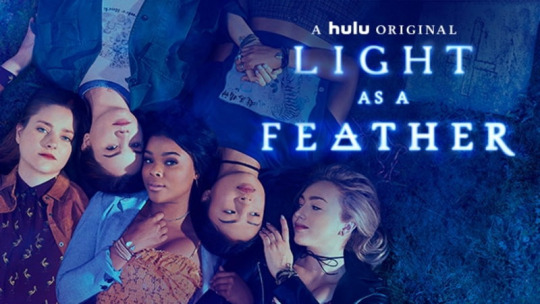
Creators wisely capitalized on Halloween season for its release, and perhaps intentionally capitalized on the titular game’s popularity from film The Craft. However, Light as a Feather reads as Pretty Little Liars meets Truth or Dare. Reading the TV and book series’ premise, we’re led to believe we’ll see something very different from what unfolds. The problem is that those differences turn out to be painfully cliché.
We’re given the typical setup for a clique: The Fab Four, high school teenagers who the wardrobe directors clearly believed should be dressed like collegiates. Cue the outsider who wants in and the hell she brings with her. Unfortunately, the focus is mostly on how this outsider uses relational aggression and schemes to ruin The Fab Four’s lives, so we rarely see the supernatural outside of the predicted deaths themselves. When not working this predictable plotline, the series relies on hallmarks of other horror films as an attempt to scare viewers.
Blood Dousing (a la Carrie)
Cocooned Bodily Growth (a la Alien)
Oddly Lit Hallway Entry
Bloody Bird-to-Windshield Death (a la The Birds)
Fingernails Falling Off
Bite into an Apple and See Maggots
Some would call it clever. Some would call it cheating. You be the judge.
My biggest issue with the series is that we know from the start that Violet is a sociopath with a supernatural connection. Therefore, half the season is spent in frustration, waiting for the central characters to figure out that she’s the antagonist and if there’s a way to stop the deaths from happening. There’s not much mystery or thrill to this when Violet is presented as a humiliated wallflower like Carrie at first, then shown immediately after as the obsessive wannabes from Single White Female and The Roommate. Per the mean girl clique tone of the show, her character largely feels like a modern mashup of Courtney and “Vylette” from Jawbreaker. Coincidence? I think not!
My other issue is the finale, both its murky logic and rushed pace. *Spoiler: McKenna concludes from seeing her sister Jennie’s spirit and reading the journal’s singular entry about the game’s origins, that the game’s curse is maybe “from some other world” and “feeding off our souls.” Nothing in the series hints at another world for the supernatural, and as death is very much part of the world as we know it, that makes no sense. As I’ve not read the book trilogy, I’m not sure how the curse and other world expand, but this murky conclusion felt like a feeble attempt to create mythology. Further, the rushed pace of the finale makes for a very anticlimactic ending.
On the flip side, the series does have redeeming qualities. Namely, its thematic exploration of substance abuse, flawed characters, and diversity. The series looks at substance abuse through people of all ages, races, and backgrounds (*spoilers): McKenna’s mother is an alcoholic, her sister Jennie overdosed on a prescription pill from Alex, Alex buys prescription pills from Trey to feed her own addiction, and Candace ends up on them at the Daybridge Center (where she also undergoes “treatment” in water tanks and pools off-screen, but sounds suspiciously like Eleven from Stranger Things).
The series shines a harsh light on everyone being flawed in some way. Each of the characters carries grief and guilt, and must deal with the consequences of their choices, good or bad. It speaks clearly to the point that we shouldn’t sacrifice others for our own personal gain. I could also grant kudos to the casting department for inclusion of African-Americans and Asians. Despite being flawed token characters, both Candace and Alex defy racial stereotypes, with Candace being the smart one and Alex being a pill-popping dancer.
All in all, Light as a Feather is an extremely light teen supernatural, not meant for anyone who likes the dark or dramatic. But seeing as the 10 episodes are only 25 minutes each, it does make for a perfect binge session that’s easy to follow.
1 note
·
View note
Link
Thank you @shadesofmelanininc for sharing my story!
0 notes
Text
Honestly... It Hurts
Some of you are friends with or follow the person who sexually assaulted me, whether you know it or not. And when I see his face when you repost his pictures and videos, despite me blocking him on all social media accounts, it hurts me all over again.
When I see him, I want to cry and vomit at the same time. I feel angry and sick. I feel pain and rage and shame all at once. I want to burn him alive yet hug all the other women who were victimized and could be victimized by him.
It hurts because I know that even though what he did was wrong, when I tell the story, someone will inevitably think I’m not right. It hurts because if I tell the story knowing what I and at least one other woman experienced, we may not be believed and may have to relive the trauma publicly without justice or support.
It hurts because as much as I advocate for survivors of sexual violence, I’m still not in a strong enough place to go public. But I want to go public on behalf of those of us who survived his sexual violence. But I don’t want to retraumatize anyone else who isn’t ready to go public. But I don’t want anyone else to suffer.
It hurts because this person that you consider a friend, I considered a friend, too, before that time. It hurts because I thought he respected me enough to take “no” for an answer, no matter how tipsy. It hurts because when I said “no,” he was determined to have his way with me, but when I said “yes,” he wasn’t interested.
It hurts because the same hands he used to choke and force inside me, he uses to entertain you all online. It hurts that he sleeps well despite what he’s done, yet we sometimes can’t sleep because we get triggered by his face and name. It hurts so much about him is a red flag we’ve all turned a blind eye to. It hurts that the women who date him have no idea. It hurts that his daughter may never know how foul the man raising her is.
It hurts. So much that I’ve been to therapy, written blogs, and advocated like crazy against sexual assault to “move on.” But it’s not something you get over or move on from, it’s something you live with. It’s a pain, a rage, and a shame that you never know when you’ll be reminded of. It’s being caught between suffering in silence and suffering for the world to see.
0 notes
Text
Black Girl Magic: A Rise in Fantasy Representation on Screen
"Black Girl Magic” is a phrase coined in 2013 by blogger CaShawn Thompson, in “celebration of the beauty, intelligence and power of Black women everywhere.” It has since become a rallying cry for black women of different backgrounds to celebrate their accomplishments and moments together in sisterhood. But unlike the phrase and recent movement behind it, “Black Girl Magic” in the literal sense has rarely been showcased at the forefront of film and television. There are many film franchises and shows built on fantasy or supernatural stories, but these largely feature white casts and protagonists. Since the 1990s, however, more black women with magical abilities have moved to center stage.
Rochelle Zimmerman - The Craft, 1996
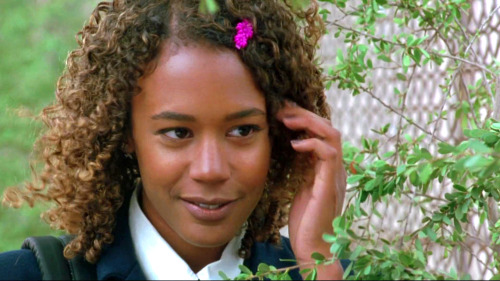
An outcast at her Los Angeles school because of her skin color, Rochelle befriends girls on the fringe who form a coven to regain power over their teenage lives. Rochelle is not only one of the witches in the main cast, but a skilled swimmer whose goal is to make the high school team. When this is hindered by a racist school bully, Rochelle aptly casts a spell to make the girl’s hair fall out. In addition to this, she has the power of telekinesis, levitation, and glamouring. Though left without power at the end of this cautionary tale, Rochelle is a rare portrayal of black women unapologetically using their power towards their own goals.
“I drink of my sisters and I ask for the ability to not hate those who hate me. Especially racist pieces of bleach-blonde shit like Laura Lizzie.” - Rochelle
Eve Batiste, Mozelle Batiste Delacroix, Elzora - Eve’s Bayou, 1997
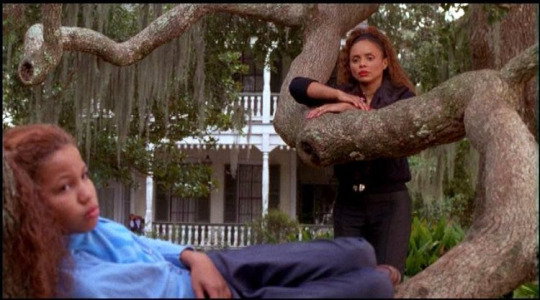
This trio took African-American cinema to new heights in its portrayal of black women with clairvoyance and voodoo. Eve, the youngest, finds her dreams to be visions of tragedy to come. Her gift of sight mirrors her aunt Mozelle’s, a woman who not only has visions, but reads people’s lives by holding their hands. Mozelle also sparingly uses voodoo to help customers if they’re desperate enough. Eve and Mozelle encounter Elzora, an elderly woman who tells fortunes at the market and proves to be quite twisted. The three are brought together in a tragic coming-of-age tale in which Eve takes on her troubled family one summer in a Louisiana bayou.
“Like others before me, I have the gift of sight. But the truth changes color, depending on the light. And tomorrow can be clearer than yesterday. Memory is the selection of images, some elusive, others printed indelibly on the brain. Each image is like a thread, each thread woven together to make a tapestry of intricate texture. And the tapestry tells a story, and the story is our past.” - Eve
Raven Baxter - That’s So Raven, 2003 - 2007
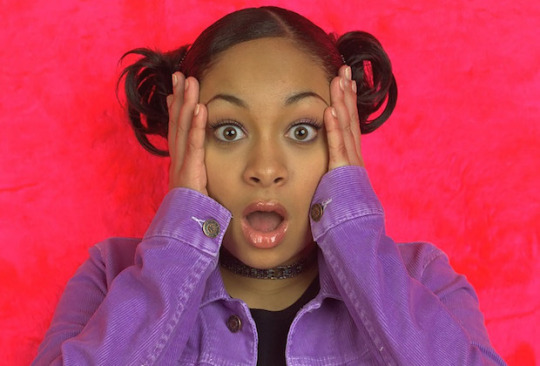
Dealing with friendships, boys, and dreams of becoming a fashion designer, a huge part of Raven’s life are her psychic visions of the future. She’s very insecure about being seen as a freak if anyone finds out, but also has unique experiences and life lessons during her adolescence in San Francisco because of her gift. Raven afforded many children and teens a lighthearted, relatable portrayal of Black Girl Magic in comedy. She returns as the star of spinoff and sequel series Raven’s Home, which aired in July 2017 and is set in Chicago.
“Oh, snap!” “Ya nasty!” “I’m okay!” - Raven
Alex and Cam - Twitches, 2005, & Twitches Too, 2007
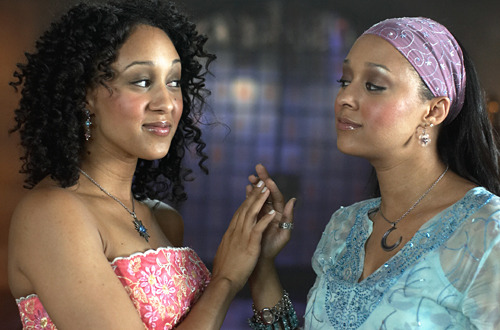
Cam and Alex discover their powers and one another on their 21st birthday, and soon find out that they belong to a world of witches and warlocks called Coventry that they were taken from at birth for their own safety. They must save the day in both films, using their combined powers that coincide with the sun and moon. This portrayal of witches is on the spectrum between previously-mentioned Raven Baxter, an original TV character, and the upcoming Bonnie Bennett, another book character that undergoes a race lift for the TV adaptation.
Bonnie Bennett and The Bennett Family - The Vampire Diaries, 2009 - 2017
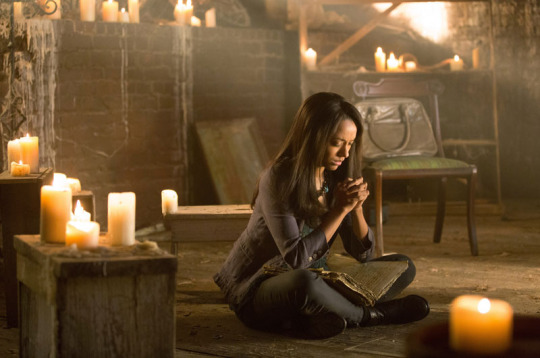
Bonnie discovers her penchant for witchcraft as a teenager when her best friend gets involved with vampires. She goes on a journey of honing her powers, learning from her grandmother Sheila that they hail from a long line of matriarchal witches. They are descendants of Emily Bennett, who was a powerful witch in Mystic Falls, VA in the 19th century, as well as one of the most powerful witches of all time, Qetsiyah. Bonnie experiments with both dark and natural magic, eventually developing the powers of divination, healing, necromancy, and psychokinesis (aero, bio, pyro, and tele). Through Bonnie’s storyline, audiences have an example of Black Girl Magic through several generations of powerful women in the same family.
“Witchcraft has its limits. If I push too hard, it pushes back.” - Bonnie
Queenie and Marie Laveau - American Horror Story: Coven, 2013 - 2014
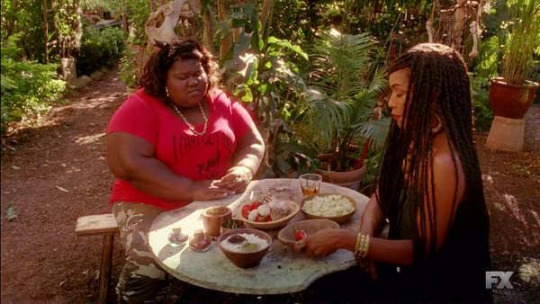
Queenie, a new student at Miss Robichaux’s Academy in New Orleans, is descended from Tituba of the Salem Witch Trials, and calls herself a “human voodoo doll,” able to transfer self-inflicted wounds and pain to others. She later performs telekinesis, teleportation, mind control, and astral projection. For a time, Queenie joins the fold of Voodoo Queen Marie Laveau, based on the real-life, renowned figure. Marie survives to modern times because of an immortality deal with Papa Legba, in which she must sacrifice an innocent once a year. In addition to her voodoo mastery, Marie demonstrates telekinesis, teleportation, necromancy, and a war cry that causes people to turn on one another. Both Queenie and Marie take on an immortal racist and other threats in the war between hunters, voodoo practitioners, and witches in this campy, dark story.
“I grew up on white girl shit, like Charmed and Sabrina The Teenage Cracker.” - Queenie
Abbie & Jenny Mills - Sleepy Hollow, 2013 - 2017
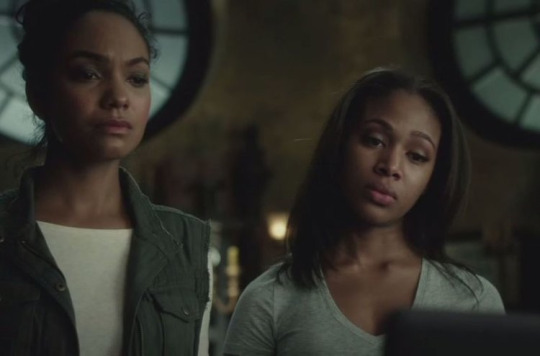
Abbie, who has prophetic dreams, learns that she is one of Two Witnesses in the Book of Revelation meant to prevent the apocalypse with Ichabod Crane. A Lieutenant originally headed to the FBI, she remains in Sleepy Hollow, NY to rise to the cause. She can also see spirits, have visions of the past, and assist with casting spells. Her sister Jenny is drawn into the fight, having seen the demon Moloch when they were children, as a supernatural relic hunter. This is one of the rare portrayals of black women, fantasy, and the Bible coming together.
“Here's what we can do: no more first-hand accounts of witches or founding fathers. Or donut tax outrage unless you want to be sent back to the asylum.” - Abbie
These portrayals of Black Girl Magic, which feature characters who have storylines independent of their white counterparts, are markedly different from “The Magical Negro” stereotype in cinema. The Magical Negro was first seen with The Song of the South (1946), but mostly lends itself to male characters. The handful of black women who fall into this category are Oda Mae Brown in Ghost (1990); Mother Abagail in adapted miniseries The Stand (1994); Jezelle Gay Hartman in Jeepers Creepers (2001); Missouri Moseley on a single episode (2005) of Supernatural; and Evelyn in Annabelle (2014). These characters have no purpose in the story beyond helping white ones, even going so far as to sacrifice themselves in some instances.
Black Girl Magic speaks to a beauty and power that black women have on their own, as evidenced by stronger characters in TV and film recently. Fortunately, the road doesn’t end here. Coming to television soon are actresses Sibongile Mlambo in the role of a mermaid on the Freeform show Siren, and Clark Backo in the role of a psychic and descendent of Supernatural’s Missouri Moseley on Wayward Sisters at The CW. On the big screen, expect to see Oprah Winfrey in the role of Mrs. Which for Ava DuVernay’s A Wrinkle in Time in 2018.
As black women continue to see the magic within themselves, they can now see even more of it represented on screen.
*This piece was published August 9th to Shades of Melanin, Inc.
**Update: On September 7th, Twitches was added to this Tumblr post.
0 notes
Text
The Devil You Know
*Trigger Warning: Sexual Assault
If only we could have warnings before these attacks occur.
As long as I’ve been an advocate for safe sex and against sexual assault and rape, I never envisioned myself as anything more than that. An observer, an educator, a supporter. But that changed in May of 2015.
*Note: For the sake of privacy, certain names will be omitted and a bracketed title will be used instead.
It had been a year since I’d graduated college, and I had spent that year working in Memphis before pursuing graduate school. Summer was still the prime time to get together with friends, especially for those of us who had stayed in contact from high school and still lived nearby. [Friend A] hosted one of his usual kickbacks at his parents’ house, as they were used to entertaining company. These kickbacks usually consisted of cards, drinks, and music. Many times people went off to make out, hook up, or retire when they had had enough fun.
This particular night I brought [Friend B], as she had recently graduated and wanted to see what hanging out with the folks from high school after so many years was like. She had no idea how handy she would be later.
Near the end of the very late night, everyone had either left alone or paired off. I lived so close to [Friend A]’s house that I was one of the last to go. That plan was soon interrupted by [Perpetrator], [Friend A]’s best friend, who at first casually asked for a shoulder massage and then to cuddle on the living room couch before I left. “All right, but at 3:00 I’m leaving,” I said, setting my phone on the coffee table. We cuddled on the couch and he played in my hair, a huge blown-out afro at the time.
In the midst of this, I asked, “Why did you want to cuddle with me?” To which he responded, “I don’t know... you’ve always been around. I had actually planned to talk to you earlier, but you had already chosen [Friend C].” The friend he was referring to was someone I was actually interested in at the time, and as [Perpetrator] mentioned his name, I realized that I felt nothing for the perp.
Slowly but surely, as we made small talk and laid in silence, [Perpetrator] made his way on top of me. As tipsy as we were, I didn’t come to the full realization of how compromised I was until we were kissing. Then he was pulling my pants down, as I worked hard to keep them up.
“[Perpetrator], we are not doing this,” I said.
“Why not?” [Perpetrator] asked.
“Because we’re on [Friend A]’s couch!” I said, this being all I could think of. Surely he would come to his senses and see how ridiculous this was.
“It’s okay, I’ll clean the couch!”
“We could get caught!”
“Nobody is coming out here, I promise you.”
But that didn’t make me feel safe; it made me feel more helpless. [Friend A] was in his room with his girlfriend, while his parents were asleep in their own room. Yet some part of me told me not to scream for help, not to be dramatic. So I didn’t.
“It’s 3:00 - I have to go.”
“We could’ve been having sex for like an hour by now!”
“I know, but we can’t do that.”
“Do you want to have sex with me, Cierra?”
“I mean... yeah?” The question floated in the air between us, but he took that as the definitive answer, already towering over me and holding me down. “But not like this,” I added.
As I tried to sit up and scurry from the couch, he put one hand around my throat and forced me back down. Then, despite my efforts to keep my pants up, he had them down enough to force his fingers inside me.
I hissed out his name in protest, shocked and afraid. I let go of my pants with one hand to push his away from me, and used my other to claw at the one he had on my throat holding me down.
DING DONG.
“Shit. I know this n***a ain’t back.” [Perpetrator] got up to answer the door, and I used this as the opportunity to put my pants and shoes back on. The guy at the door had left with [Friend B] that night, but returned to the party to crash. [Perpetrator] saw that I had redressed, and told me not to, expressing his frustration and disappointment in us not hooking up.
I didn’t know what to do. How could I take control of this situation? How could I make sense of it? In possibly the worst decision I could’ve made (to this day I beat myself up about it), I took [Perpetrator] back with me for the night, where he proved too tired to try anything else. I thought surely that it had only been a bad hookup. Maybe I was making a big deal out of things. Maybe we just needed to hook up not on [Friend A]’s couch for me to actually want to do it. But we didn’t find out that night, thank God.
A couple of week’s later, [Friend B] and I were hanging out in daylight hours at [Friend A]’s house while [Perpetrator] was there, as usual. I had told [Friend B] what happened, and while she was appalled at how aggressive [Perpetrator] was, she thought that maybe I just needed to hook up with him on my own terms. So as I entertained this possibility with [Perpetrator] later, I realized that I, in fact, didn’t want to have sex with him at all. But of course, when I told him, “All right, I’m leaving” in a pause where we debated even starting, he had his hand on my throat again and attempted penetration. This time, as I struggled off the bed, he let me go quickly and quietly.
We never spoke again.
Over the next month, I attempted to tell the story to my best friends and line sisters using humor as the overall tone. However, next to no one laughed at my story, and the one person who did laugh probably did so to make me feel better because she knew better. Everyone saw it for what it was but me, because I didn’t want to believe that I had been assaulted; that someone - someone I knew - had violated me that way; that I was a victim.
But it haunted me. Even when I began dating my boyfriend in October 2015, I met him with the defensiveness and distrust meant for my perpetrator. As I had told the story casually to my coworkers that summer, my boyfriend recognized that this was part of the reason why I was so guarded, and worked to help me feel trust and security again. It touched my soul that my boyfriend believed me and was so hurt by the idea of someone hurting me. I’m grateful to this day for his support.
Of course, he couldn’t solve everything that was wrong with me. The trauma of May 2015 followed me until one fateful day in October 2016.
It was 1 year and 5 months later, and I was at Loyola Marymount University. A girl was raped in the library restroom, and all students were required to complete an online “Think About It” module on sexual consent. It wasn’t until I was in the middle of this, reading about the terms and statistics of acquaintance rape, that it all came flooding back like a tidal wave.
I broke down. I called my boyfriend and my line sister with tears free falling, confused as to what to do and alone in Los Angeles with my options. My line sister encouraged me to go to LMU’s Student Psychological Services because I was so distraught and had never told anyone who could professionally handle it.
Seeing Dr. Wyatt changed everything. She was warm and understanding, yet honest and challenging as we did therapy sessions the next two months.
She helped me realize that there were many ways for victims to respond to sexual assault or rape, and that everyone brings their truth to light in their own time. I knew that some victims waited years to tell a single soul, but I didn’t realize how much holding that kind of truth a secret could eat away at you. I felt confused because [Perpetrator] was a classmate of mine from 6th - 12th grade, and we had even seen each other while in separate colleges because of our mutual [Friend A]. I never saw him as a capable of doing such a thing to anyone, let alone me. I felt ashamed because I thought I should’ve screamed for help, never seen him again, told my family. I felt helpless because I knew no matter how much therapy I got, no matter if I confronted him, there would be no justice for me.
Dr. Wyatt helped me work through all the moving pieces in my particular case. We began to understand together how [Perpetrator] was used to having attention and affection from women because he was so often praised for his looks, but very likely felt inadequate in life due to the fact that he had no degree, job, or transportation when so many of us in the kickback group did. He, [Friend A], and I all shared an interest in film, and the fact that I was going to film school probably didn’t help. Also, contrary to his claims that night on the couch, I knew he had never had any interest in me - I was just the last one there, and even as the last woman standing, I had no interest in him. These factors were all important to understand because rape is a power-based attack on a person. I’m not saying it was pre-meditated, but it was an attack based on ego and convenience. I didn’t have to be a person he was interested in - I was a body.
As for my decision to try to rebrand the attack as a hookup I could control? This, she explained, was my mind’s way of protecting me from the full extent of the emotional trauma. I had shielded myself by thinking I could regain control of a situation that I was completely powerless in, but it clearly didn't work.
Eventually Dr. Wyatt and I worked up to the point that I decided I would tell my mother, sister, [Friend A], and [Perpetrator] over Christmas break. She prepared me for the variety of reactions I may receive, especially the possibilities of anger or denial from the perpetrator. December of 2016 would be very progressive for me in gaining back the power over my life, but it also had a twist I didn’t expect.
My mother and sister believed me immediately, and I watched them both wrestle with their emotions, my sister the less successful of the two.
It was December 20th that I told [Friend A] his best friend sexually assaulted me in his home almost two years ago. We had just ordered lunch at El Patron in Bartlett, TN and started catching up. He mentioned how long it had been since we spoke or hung out, and I tried to smoothly segue with, “There’s a reason for that.” I breathed deeply, trying to slow my heart rate after the anxiety had built up. I hesitated. Then it all came out.
I told him about how I had been in therapy for the last two months after my trigger experience, and that the source of my trauma was [Perpetrator]. [Friend A] was quiet the entire time, attentive and calm. When I finished, he apologized: “I’m sorry. And I’m sorry that that happened on my watch.” I thanked him for his apology, but assured him it wasn’t his fault. I asked if everything made sense and what he thought about it. He said, “I’m kind of not surprised.”
Not surprised.
He told me about how a girl we went to high school with, [Fellow Victim], also came forward to tell him about how [Perpetrator] had assaulted her when they dated. I was floored. He had struck again. It hurt me to think that I may have been able to prevent it had I spoken up about my own assault sooner. The only thing I could look to was that this girl had confronted him, but [Friend A] admitted he didn’t know how their conversation went.
When I said that I wanted to tell [Perpetrator] how his actions had affected me, [Friend A] said, “I think you should. I think he needs to hear it.” I suggested that he help get us in the same room one day soon, and he agreed to do anything he could to help. That was the friend I knew. I told him I didn’t expect him to mediate, and he agreed not to say or do anything without me.
”You know he has a baby now?” [Friend A] asked.
”Holy shit. You’re kidding,” I said, stunned at this revelation.
He pulled out his phone to produce a photo. “Is it a boy? I hope it’s a boy,” I said before I even thought. I was disturbed by the possibility of this man bringing another girl into the world given his behavior. [Friend A] proceeded to tell me that it was a girl, proven by the photo on his phone of the one- or two-month old child. He told me that he thought [Perpetrator] having a daughter was helping him, in the sense that he was now more focused on trying to be there for her. He was working a job and resolving conflict with the mother of his child so that he could provide some stability to her life. I was unmoved and unconvinced.
Still, I felt relieved that so many steps were out of the way. I had done it! I never imagined it would be such a breath of fresh air not to carry that burden alone.
Unfortunately, I didn’t get to talk to [Perpetrator] that Christmas. It disturbed me going back to school the spring 2017 semester knowing that he was still walking around thinking what he’d done to me, [Fellow Victim], and God knows who else was perfectly fine. I would have to wait until May 2017 to try again.
In the meantime, I made sure to take care of myself. So often people rush victims of assault and rape to take action that they forget a key part in being a survivor is healing. I haven’t experienced anger yet, because I still feel sadness over the entire ordeal. I still wish it hadn’t happened. Some days I forget it did, and then others it replays in my mind. I read and discussed with Dr. Wyatt in my spring update session how to develop healthy coping tactics. Sometimes it’s okay for me to rant against rape culture and sexual violence, and other days I have to know I’m not emotionally equipped to watch Law & Order: SVU.
I didn’t get to confront [Perpetrator] in May, and had to return once again with unfinished business. The healing process for me has been up and down, but I’m happy to say that most days are up. I think closure is necessary for many of us, but I don’t know if I’ll ever get it, at least from that conversation with him.
All I can hope for is that other survivors live and speak their truth, and that people become more aware of how their actions affect others.
I’m sure if you’ve read this, know any of the players, and put two and two together, then you may have deduced who my perpetrator is. I can assure you that any shock or horror you’re feeling is spawned by the fact that the devil you know is not always better than the one you don’t.
I recognize that some people may not believe me or may find me at fault, as rape culture would have it. In choosing to share my story, I know I’m opening the door to commentary, but I stand by the fact that no one will be putting me on trial for what I’ve endured. “But, Cierra, you kissed and cuddled!” No other person I’ve kissed and cuddled with had a problem taking “no” as the final answer. “But you confused him going back!” Even with mixed signals and blurred lines, no one else has perpetrated a crime against me. “But you were both tipsy!” First time was tipsy, second was sober. It is not my job to convince you of my truth.
The weight that has lifted from my heart in sharing this is enough.
Power to you, survivors. Power to you, too, supporters. We’re not alone.
For more information and ways to support survivors, visit RAINN or NSVRC.
2 notes
·
View notes
Text
An Accurate and Hilarious Look at Burning Sands
After arguing with many non-Greeks about how problematic it was for them to form misinformed opinions, generalizations, and stereotypes based on Netflix’s controversial new film Burning Sands, I decided to watch and blog about it. I can honestly say that it is filmed beautifully, but it is quite flawed and gave me a good chuckle until the last 15 minutes. Below is a list of my reactions to incidents in the film, as well as an explanation of their accuracy to Black Greek Letter Organizations (BGLOs).
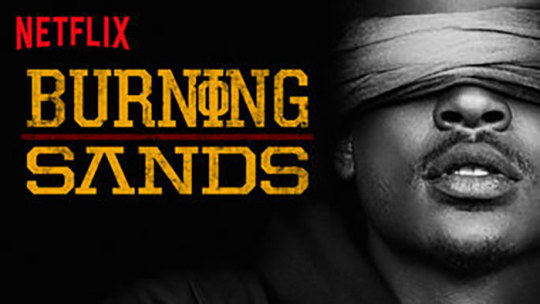
Why is only one man meeting you in the woods to “pledge” you? Where are the rest of the people who are supposed to teach you the lessons, history, and such? How does this one person alone decide that you get dropped?
Who in their right mind lets someone kick them in the ribs?
Part of the process is learning how to respond to situations with the urgency you would if the person next to you was your blood sibling. There is no way that anyone would get in trouble for jumping down to take the blows for his line brother. (Also, plot hole - what happens to this dude?)
That breakfast errand was real, lol.
Who advertised the probate they started to watch? Literally 20 people were there, lol.
I see what they tried to do there with the African-American History course, relating the pledge process to the abuses African-Americans suffered during slavery. However, part of what you’re taught is how to survive under mental and physical stress like our ancestors did. Clearly some people have taken that inspiration way too far.
Excuse the language – but ain’t no way in hell would you ever be charged up in public – and at a car wash! BGLO members don’t put their business out there like that. Nor do we just up and start a step at car washes, lol.
Branding parties are a thing, but they have another name lol.
Yes, we do stroll and step at parties. Even before I was in a sorority I knew to suck it up and get out of the way.
AIN’T. NO. BODY. SPITTING. IN. MY. FACE! WHAT. IN THE ACTUAL. F**K?!
This paddling scene was something serious! I was a little emotional watching it myself. But old boy jumped in there to call his frat brother out, which does happen! Certain members are known for getting carried away, and they need to be held accountable for their actions. Everyone doesn’t have the right mindset when it comes to pledging other people.
Caught by the po-po! And they lucked out.
By Hell Week you shouldn’t need to read history from any papers. *side eye*
Yeah, so, I don’t know if fraternities really force you to have sex with women on line. But this was a page ripped out of Spike Lee’s School Daze with a different spin. Shout out to this girl being sex-positive and self-educated while screwing the pledges, though! lol She killed me!
Who spits two lines of “Invictus” at the soup kitchen?
Plenty of people break up before line, on line, and after line – but people also stay together. (Failure of a sad moment.)
Is this the school pool? Why are these folks in public so much? You’re trying to get arrested and expelled! Alsooo, water is where many draw the line because ain’t nobody drowning for a fraternity or sorority. See 2 & 11.
This boy is likely suffering from broken ribs and a punctured lung, yet y’all are still playing games!
I’m an hour and ten minutes into the movie, the characters are near the end of Hell Week, but the Quad doesn’t know his Ace’s real name. (This is often a joke on lines of 105 people, but their line has 5!) How long has this process been, and what have you been learning all the other weeks?
I don’t know what kind of school these kids are attending, but an outburst like the one he had on Alfre Woodard would’ve gotten him reported. People struggle with grades a lot, but ideally, you’ll have been doing so well to begin with that you don’t fail your classes. You’re a student first. Failing defeats the purpose.
“Humiliation builds humility” is a quote I’ve never heard BGLO members use. But I imagine someone overzealous would use it.
Old boy is right about how many problems have come out of pledging going underground! That’s how hazing was truly bred. Above-ground pledging used to be visible and regulated. While incidents have taken a nasty turn throughout history, the most severe cases have occurred since the ‘90s.
I’m happy old boy wrote his paper. But please don’t let this trick you into thinking a) you can’t be in a fraternity and be intellectual, or b) you can’t be in a fraternity and be conscious of social issues or African-American history. I appreciate his sentiment about treating each other and those after you with respect despite the flaws of your process, though. That’s real.
Hell Night was wild to watch for these boys. Everyone’s is different. But it was rough to see them beat on these boys until one had a seizure. Feel like I just watched hypermasculinity spiral completely out of control. Then these folks really left them to take their LB to the hospital and potentially die? Hell no.
Films like the revitalize much-needed discussion about hazing. There’s no denying that the mental and physical scars, including severe injuries and even death, that have been reported need to be eliminated. No one should go into these processes willing to accept abuse, but that’s a hard line for people to draw sometimes. Hence, all organizations in the National Pan-Hellenic Council have made strides to end hazing and reform the Membership Intake Process, including moratoriums on intake and changes to the policies and bylaws.
However, for the general public to assume they have a greater understanding of the Divine Nine based on this film is ridiculous. It is a very specific representation of our experiences, and not everyone’s is the same. All cases of pledging are assumed to be as bad as the one depicted, when oftentimes that is not true. If we had more well-rounded depictions of the Divine Nine, people would have a better understanding of the organizations as a whole, including pledging vs. hazing.
The issue that BGLO members face is that while we want to educate the public, it’s taboo for anyone to talk about their process publicly. What really needs to happen is the conversation between black fraternity and sorority members who believe in pledging and those who don’t. Then we can discuss how to keep the best parts of the pledge process, and eliminate the horrors of hazing.
P.S. A really good response of BGLO members was transcribed by The Root.
P.P.S. They kept playing “Knuck If You Buck” – which still makes me bounce every time – but NO ONE was strolling to it! How, Sway?!?
0 notes
Text
Loving Memphis: A List of Bright Places to Enjoy and Meet People
Memphis, TN is a city known for four things that people typically know of before making any travel plans there: BBQ, blues, Elvis, and crime. I was raised in Memphis, and returned for two years after college graduation. I quickly realized how much easier it was to enjoy the city as a 21-year-old with a car than anyone under the age of 18. I have since maintained a list of the best and brightest places to visit based on my own experiences:
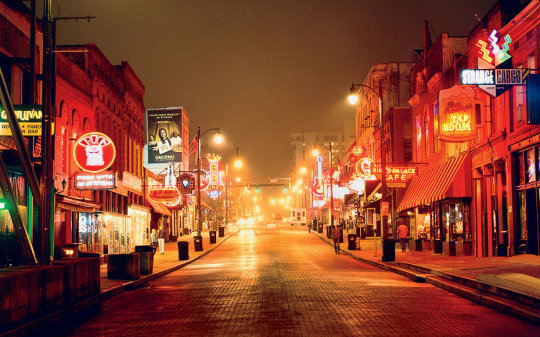
Restaurants:
Huey’s - This is hands-down my favorite place. Known for their burgers. I always get the World Famous Huey’s Burger and Tennessee Tea.
Osaka - A nice sushi and hibachi gem in Poplar Plaza. I recommend the Big Daddy sushi roll.
Bluff City Coffee - The cutest little coffee shop downtown! They get their pastries from a local baker, and offer homemade dog treats for your furry friends. The chai tea latte and all of the sandwiches are faithfully good.
The Green Beetle - Downtown on Main Street, this seems like a dive, but has food that’s rich in flavor. The Philly cheese steak, patty melt, hot wings, and fries are to die for!
Jim ‘n Nicks - BBQ win!
Central BBQ - Another BBQ win, but the dry rub especially!
Jerry’s Sno Cones - Crack in a cone in the depths of North Memphis.
Scoops - A black-owned gelato and crepe bar downtown. Red Wine Sorbet is my flavor of choice.
Onix - A black-owned soul food restaurant that features live bands. The sweet tea is everything, but the lemon pepper wings are good, too.
DeJa Vu - A black-owned New Orleans-style restaurant in downtown Memphis. Can be pricey, but the food’s delicious.
Coletta’s - An Italian restaurant in Bartlett with an old-school, family feel.
Happy Mexican - Guess the style? lol The staff is always friendly here, and the food and drinks never fail. I recommend the fajitas, quesadillas, Taquitos Mexicanos (my fav), and the Margarita Dip! Also, please drink a Walk Me Down while you’re there. Thank me later.
Boscoe’s Squared - A cool spot in Overton Square with a huge beer menu, cool brunch menu, and intimate seating.
Babalu - A Mexican-Cuban fusion restaurant in Overton Square known for their tapas. They have really good seasonal drinks around the holidays.
Sweet Noshings - A sweet shop in Overton Square with their own candy, chocolate, ice cream, and popcorn! Let your inner child run wild!
Don Don’s Hot Wings - Wangs and thangs.
Dixie Queen - Absolutely love their lemon pepper and honey gold wings, their seasoned fries, and their lemonade.
Rendezvous is our claim to fame a la Food Network. I’ve also heard fabulous things about Southern Hands.
Tourist Attractions:
Stax Museum - An incredible history of the music of the South, particularly Memphis and Stax Records artists, starting all the way back with the significance of “field songs.” It’s beautiful and so enlightening.
National Civil Rights Museum - Fun fact: I worked here as a tour guide for a year. Your experience touring the museum after its renovation will be much better than mine working there, lol. But it’s extremely profound and an experience the whole family can appreciate and learn from.
Woodruff-Fontaine House - A cool Victorian house for an old, famous family in Memphis, known for its architecture, décor, and hauntings.
Slave Haven - A small house-turned-museum that allegedly served as a safe house for slaves traveling on the underground railroad. Historical accuracy is contested, but still cool to see.
Yes, Gracelend is here, but most natives have never been! There are also the Blues Hall of Fame and Memphis Rock ‘n Soul Museum.
Bars, Clubs, & Lounges:
Fox & Hound - If you’re a foxy lady or hound dog who likes great drinks, sports on every flatscreen, and pool, this is the place for you. I always go for the beer-battered fish and chips, and the Kryptonite ‘Rita.
Greencork Wine Bar (closed until 2018) - A snazzy little spot near the Cooper-Young district that allows you to buy a card to test out wines from about 20 dispensaries as you lounge by the fire or sit at tall tables with friends. Food options are more expensive than they’re worth, though, and you’ll need to know which types of wines you favor before testing to get more bang for your buck.
Club Love / Love Lounge - A recent business development, this lounge that typically caters to the 30s+ crowd is an excellent mix of throwback jams and new music as the night goes on. If you want a more sophisticated night out, this place is great. Hosted my 23rd birthday here.
Mollie Fontaine Lounge - Across the street from the Woodruff-Fontaine House, this historic home turns into a lounge at night with great truffle fries, girls dressed as vampires, and men Vogue-ing. It’s lit!
Wet Willie’s - While the history behind this place is pretty ugly (see Ida B. Wells placard outside), it now serves as the best place for a frozen alcoholic beverages. The Bob Marley is where it’s at! I once went with the girls, recognized a guy I knew having a birthday outing, and his crew bought 20 jello shots for us all to share. Such is the Beale Street party life.
Peabody Rooftop - This is something different. You can see the sun set, hear cool live bands, and enjoy drinks and complimentary food if you’re there on time when it starts. Great chance to be with a different crowd and have some fresh air as you sweat out the liquors, lol.
Arts & Entertainment:
Studio on the Square - A quirky, old-school theater in Overton Square that serves alcohol and real food to go along with your movie. Along with typical showings, has indie films and other cool stuff.
Paradiso Theatre - Styled like an Italian villa, this theatre also serves alcohol to accompany your film.
Hollywood 20 Cinema - More in my neck of the woods, aka in Bartlett.
Hattiloo Theatre - A black-owned performing arts theatre that hosts plays and musicals with African-American casts and narratives, as well as panel discussions and other events with topics related to the black community.
Playhouse on the Square - A theater in Overton Square.
Crosstown Arts - An art gallery in the Sears-Crosstown area that hosts changing art exhibits and other artsy-fartsy events.
Rumba Room - A nightclub that specializes in salsa dance lessons and Latin foods, while also hosting poetry nights and dance recitals from other companies and troupes around the city.
We’re also home to the Indie Memphis Film Festival and On Location: International Film & Music Festival. That scene is slowly building.
Nature:
Memphis Botanical Gardens - Make sure you go in full bloom or else it’s like your backyard, lol. But it’s really great, with a relaxed path through the entire thing as well as a Japanese garden bridge. I also enjoy their on-location restaurant Fratelli’s.
Shelby Farms - This huge, huge, huge plot of land is the best place for a wide variety of hiking and running trails. They’re also home to the Starry Nights drive for Christmas, and Earth Day in April.
W. J. Freeman Park - This little park is tucked into Bartlett, and it’s usually empty if you want some privacy for a quick jog or to walk the dog.
Mississippi River Walk - Beautiful and serene location if you want to go for a walk near some water. Just don’t stay too long into the night or when it’s storming, for obvious reasons.
Shopping:
Wolfchase Galleria
Wolfchase Commons
Collierville Carriage Crossing
Poplar Plaza
Polish Girl - A black-owned nail shop with cool sugar scrubs, mixed drinks, and a playlist that your girlfriends will enjoy.
Diva Nails - An Asian-owned nail shop designed like a Venetian spa.
Events:
Grizzlies Games - Basketball is what makes the world go ‘round here.
Redbirds Games - Good family or work event if it’s not too hot out. If so, wear a hat to shade yourself and buy some frozen pink lemonade.
Africa in April - A festival of art, food, and performances celebrating the diversity of Africa in Robert Church Park downtown!
Latino Memphis Festival - A festival of the same things, but in Overton Park with the country of celebration changing every year!
Events on my to-do list are Beale Street Music Festival, Latino Memphis Dia de los Muertos, Curtis Givens All White and All Black Affairs, Omega Psi Phi Sundresses & Linen Party, Best in Black Awards, 40 Under 40 Urban Elite, and Wine on the River.
That concludes my recommendations, everyone. A lot of things are coming to Memphis in 2017, so keep your eyes peeled for new adventures in the 901. I can’t wait to explore even more places to add to this list. Enjoy!
1 note
·
View note
Photo
YES!!!
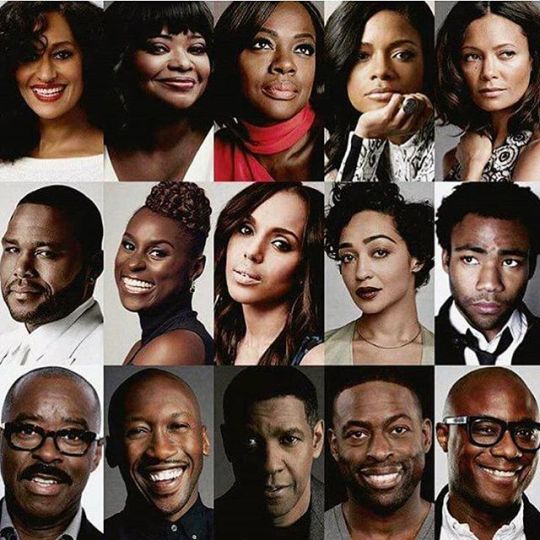
Golden Globes 2017! #BlackExcellence #BlackNominees
156 notes
·
View notes
Text
The Fragility of Masculinity
Masculinity is so fragile in America.
mas·cu·lin·i·ty /ˌmaskyəˈlinədē/ noun: possession of the qualities traditionally associated with men. synonyms: virility, manliness, maleness, machismo, vigor, strength, muscularity, ruggedness, robustness; informal: testosterone
Reading the dictionary definition, you see that it isn’t much of one. What defines masculinity?
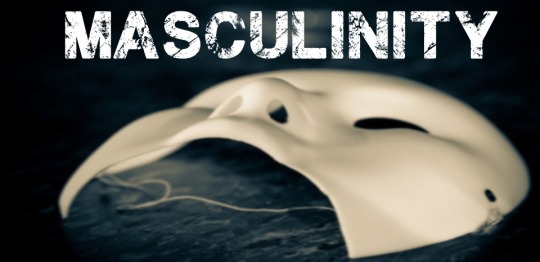
On the one hand, it’s defined by how much you can’t do without being perceived as weak, feminine, or queer. This could take on a number of forms: crying when emotionally overwhelmed or distraught; expressing your platonic love for a male friend or family member; pursuing art, dance, or fashion; being mindful of hygiene and beauty. The list honestly never ends because these things are all so subjective.
On the other hand, it’s defined by violence, sex, and questionable acts you shouldn’t do; but these behaviors are encouraged and normalized. When boys grow up thinking that being physically aggressive with a girl on the playground is an acceptable way to show affection, we breed the founding elements of domestic violence and distorted relationship norms. When boys are taught not to take “no” for an answer, we foster rape culture. When we teach boys that those who are different from them are subject to being punished in some way, we make hate crimes acceptable, a la Mark Wahlberg. Scholar Jason Katz explores these issues thoroughly in his documentary Tough Guise and during his TED talk.
Athletes like Ray Rice and Floyd Mayweather, who commit acts of sexual assault or domestic violence are given a slap on the wrist and only penalized when there is a public outcry. Entertainers such as Woody Allen, Nate Parker, Cee Lo Green, R. Kelly, etc. are free of punishment for their crimes against women, even when repeat offenders. Numerous news stories over the past few years have covered how many women are murdered for refusing a man’s advances at a bar, music festival, or otherwise. As if how to humbly handle rejection has never been taught to men. Gay men and trans women have been the victims of hate crimes for years at the hands of heterosexual, cis-gender men, as highlighted on MSNBC by Melissa Harris-Perry.
But being taught how to “handle” women and “exert your manhood” with other men seem to be the key lessons that men are learning, and the ones they are most misguided about. All the while, they are prevented from truly expressing themselves emotionally and physically in a positive, healthy way.
Can you see how suffocating that is?
In a time when people are supposed to be more accepted for living as who they are, it feels like the concept of masculinity has garnered a defense team to keep its shambly restrictions intact.
Even entertainers can’t sing or rap about their feelings, embrace fashion, or feel free to dance without being judged and questioned. Drake is loved by women and teased by men for discussing his feelings about relationships in his music. Young Thug and Jaden Smith can’t wear dresses or skirts for album covers and ad campaigns. Cam Newton and Odell Beckham, Jr. can’t perform their dance of choice on the football field. It seems that the times of artists like Prince being accepted are over. But isn’t that the time so many cherish?
Get over yourselves.
Masculinity is not being attacked. It’s being challenged. Because certain things in our society and culture need to change, and these definitions are just the start. That’s the agenda.
0 notes
Text
On the Lack of Diversity at the Oscars
There has been a lot of debate in the past few weeks since the announcement of this year's Oscar nominations. On the one hand, there has been a call for people of color, especially African-Americans, to boycott the awards ceremony to raise awareness of the lack of diversity. On the other, there is the assertion that the Oscars are simply given to actors who excel and that there is no racial bias in the Academy.
I find fault in both perspectives.
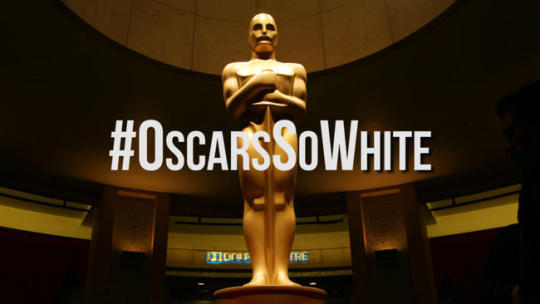
To the first point, it is no secret or delusion that the Academy Awards have excluded actors of color in the past and present. In the 87-year history of the Oscars, only 35 awards have been presented to African-Americans. As of 2016, the last time a Latina won an Oscar was 54 years ago. Those are the facts.
In recent years Hollywood has seen an increase in the number of films directed by, starring, and centered on African-Americans. However, despite the amazing work of this population, the industry still fails to recognize them. For this very reason, alternatives such as the NAACP Image Awards and BET Awards were created. These alternatives, contrary to uninformed, popular belief, do not discriminate against white entertainers; they simply award talent and productions that center on powerful explorations of people of color.
In the year 2016, it is time to see the diversity of the American population and box office reflected in the voting body of members in entertainment industry academies. That is where the change has to happen.
For that reason alone, I believe a boycott of the Oscars will not necessarily spark the change people of color wish to see. The many statements made on the lack of diversity at the Oscars, made by Jada Pinkett Smith, Spike Lee, Viola Davis, Ice Cube, Ava DuVernay, Lupita Nyong'o, and more, have caused a significant ripple in the industry. People are reacting as if they've finally realized race plays a role in entertainment.
That brings us to the second point. While the decisions over who wins awards are not inherently or deliberately racist, the majority of them are made by white males. The discrimination in the case of the Oscars comes not from directly stating that you refuse to nominate diverse stories and roles, but from maintaining the notion that a governing body dominated by one race and gender should make all of the nominations without question.
Therefore, it is not "reverse racism" as Charlotte Rampling asserts. Racism is built on the power to oppress people of other races, a power that people of color do not have over white people. Thus, reverse racism does not exist. The Oscars boycott is not racist, prejudiced, or even entitled.
The problem that people have with people of color demanding equality is that in order to empower those people, they feel they must sacrifice power of their own.
Luckily, the Academy of Motion Picture Arts & Sciences has responded to this debacle with a statement on their "historic" decision to diversify membership. We can only imagine what the changes and results will look like following this point, but it is best we not hold our breath or get our hopes up.
Change may be long overdue, but time is not on our side.
3 notes
·
View notes
Text
Blurred Lines: Rachel Dolezal, #WrongSkin, & Passing
Rachel Dolezal, president of the Spokane, WA chapter of the NAACP, was recently “outed” as being white during a legal issue with her white parents. While all races are accepted as members and officers in the NAACP nationwide, Dolezal falsely identified on her application and has been living her life as a black woman since young adulthood. Her credibility is now in question as she is under investigation for allegedly fabricated hate mail and crimes she’s reported in addition to the elaborate background story she’s told the public from her platform.
Godfrey Elfwick, a notorious Twitter hoaxer, began the #WrongSkin campaign to promote the concept of being “transracial”/“born to the wrong race,” and that race is essentially a “state of mind.” While many scholars agree that race is a social construct, the idea of being able to go from one to another is largely known as “passing” in the United States.
Passing as a race different from the one you’re originally identified as has been explored deeply in the film The Imitation of Life (1959) and books such as The Bluest Eye (1970) and Our Kind of People: Inside America’s Black Upper Class (1999). However, the subjects studied are often African-Americans passing for white, not the opposite. As cases of cultural appropriation and racially insensitive casting are increasingly recognized and debated in today’s society, it is hard to imagine that a person of whiteness would try to pass as black in daily life. Furthermore, in the current racial climate, it is hard to imagine that anyone would desire to carry the social, economic, and legal burdens that come with being African-American.
Which brings us to the issues of #WrongSkin: First, it is an inherently privileged status for white Americans to indulge in. By and large, most blacks could not pass as white and could certainly never claim #WrongSkin when facing racism. When pulled over, when entering our own homes, when attending a party or job interview, we could not claim #WrongSkin to an officer of the law to protect ourselves. We do not have the privilege of playing pretend when it comes to race and then going back to a reality without daily transgressions. To deny your race and identify with ours is to deny your white privilege and disregard our oppression.
Second, for those who claim to be “transracial” to state that they share the same racial struggle or suffer more than “naturally born” members of a racial/ethnic group is extremely condescending, insensitive, and ignorant. Anyone who claims to know the struggle of a group that has been historically and systematically marginalized and persecuted when that is not their lived experience is strongly misguided. There are many ways to ally oneself with the struggles and causes of others, and none of them require adopting their racial identity to bring about change in our society.
Finally, a large part of the debate to accept #WrongSkin and “transracial” identities comes on the heels of the media’s acceptance of Caitlyn Jenner as transgender. On the basis that someone can identify as another gender in the wrong body, several people are calling for acceptance for those identifying as a different race. This argument heavily discredits research on transgender brain development and gender studies as well as the progress in visibility the LGBTQI community has accomplished in the last several years. It makes a mockery of the ostracization and violence that the transgender community suffers, again from a place of privilege that protects #WrongSkin advocates and supporters.
So if being in the #WrongSkin and adopting our identity includes you dressing, speaking, and behaving “accordingly,” which I can only imagine is taken from mainstream media stereotypes, then your imitation is not a form of flattery. It is as disrespectful as any blackface performance, and you don’t have to be black to know how much we hate that.
3 notes
·
View notes
Link
As more white women turn to bronzers, lip injections, butt implants and the like, black women are still forced to maintain more conservative images in public to counteract stereotypes based on these features....
0 notes
Text
Zendaya at the Oscars and Black Hair Politics
Zendaya Coleman, known professional as simply Zendaya, went to the 2015 Academy Awards ceremony wearing her hair in beautifully-done faux dreadlocs.
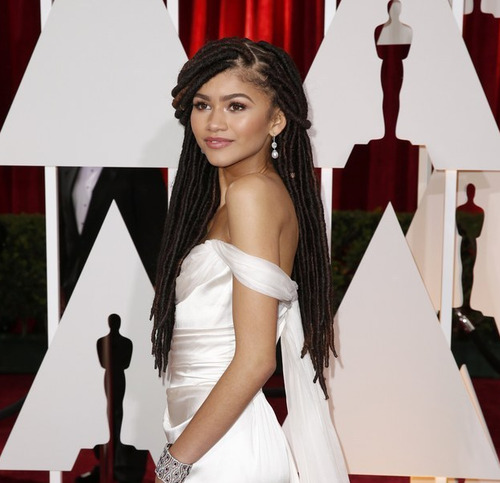
Giuliana Rancic dissed the hairstyle on E!'s Fashion Police coverage of the Oscars red carpet with a description that is characteristic of the stereotypes attributed to African-Americans, stating that they looked like they would "smell like patchouli oil or weed." This caused, rightfully so, a social media frenzy of backlash against Rancic as Zendaya posted her own response on Instagram to address the racially insensitive comments.
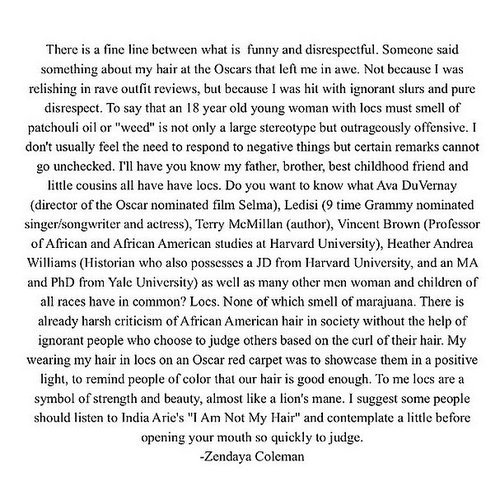
Rancic made an effort to apologize via Twitter, stating that she was referring to dreadlocs as a hairstyle belonging to the "bohemian chic" culture, not a racial or ethnic group. She continued on to make an on-air apology today to Zendaya reiterating this, though Zendaya has not responded publicly to either. The problem with Rancic's initial comments and following apology is that she does not understand why what she said was offensive.
While Rancic attributes dreadlocs to boho chic and hippies, what she fails to realize is that the hairstyle originated with people of African descent, particularly Rastafarians. It was not until Jamaican reggae singer Bob Marley brought the hairstyle into the spotlight of American media that white Americans began to adopt it into a popular subculture. Previously, Rancic even praised Kylie Jenner's faux locs as edgy in another episode, similarly to when Marie Claire praised Kendall Jenner's cornrows in a fashion spread.
Not only did Rancic make a racially biased comment about Zendaya's dreadlocs, but she contributed negatively to the hair politics already plaguing the African-American community. Black hair continues to be discriminated against in the workplace and in the military, as many styles are ruled as "fads," "unprofessional," and even "radical." But these cultural hairstyles, braids, locs, etc., are not simply fashion trends to the black community. They do not go in and out of style as the white people appropriating them see fit. They were created for our specific hair textures and serve as the crowns for our everyday lived experiences and cultural identity.
Hopefully this incident serves as a teaching moment for America to learn about the importance of cultural and racial awareness as well as to accept the beauty styles of different racial groups as simply part of the norm.
#zendaya#black hair politics#hair politics#oscars#red carpet#fashion police#cultural appropriation#stereotypes
2 notes
·
View notes
Text
Amber vs. Khloe: Race, Class, and Shame
If you've missed the still-trending Twitter feud between hip hop model Amber Rose and Khloe Kardashian, you've been living under a rock. The two exchanged increasingly harsh tweets after an interview in which Amber Rose insisted that rapper Tyga should be ashamed of his relationship with Kylie Jenner, which he has since denied is romantic, and that Kylie is essentially growing up too fast. Enter Khloe, who took the comments as being critical of Kylie and was offended that Amber would speak to the media about people she didn't know the whole story about. Chaos ensues.
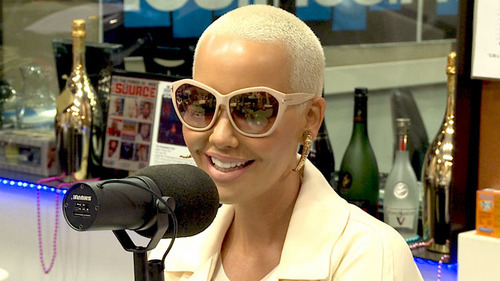
No matter whose side you're on, several of the arguments made in this fight speak to the issue of how race and class can significantly impact the perspectives of and on people in the same circumstances.
The major issue is how differences in race and class define the acceptability of sexuality. Khloe's first dig at Amber lies in her tweet addressing Amber being a teenage stripper vs. Kylie having a career. This is an effort to shame Amber for her past and means of earning money, because apparently someone whose poverty and determination to feed her family as a 15-year-old black stripper has no right to advise a 17-year-old white girl with a clothing line and millions of dollars not to grow up too fast. It's called slut-shaming, and as Amber Rose and the Kardashians all tend to be pretty progressive about sexuality, it is very unfortunate and counterintuitive. In the exchange asserting who is known and accepted as a "whore," politics come into play.
Both Kim Kardashian and Amber Rose have capitalized on being sexually exploited, dated Kanye West, married rappers, and had one child by their respective husbands. Race and class are the only differentiators between the two. As the Who's the Biggest Whore Contest continues via tweets and memes, this becomes even more apparent.
Kanye West did an interview following this in which he stated that he had to "take 30 showers" before Kim would date him after his two-year relationship with Amber. This. Speaks. Volumes. For stereotypical reasons, Amber Rose is presumed to be much more sexually promiscuous and thus dirtier than Kim Kardashian, though we have no records of who either of them have actually had sex with, aside from a sex tape and children. Thus, it can be understood that selling sex figuratively and literally, as both of these women have done, is either socially acceptable or shameful based on money and race.
Kim has been able to capitalize on her sexual experiences and become a millionaire, with clothing lines, boutiques, perfumes, books, nude pictorials, and endorsements, all prompted by the television show that followed her sex tape payout deal. Typically white women have released celebrity sex tapes with a financial safety net prepared, and it has either left their careers untouched or uplifted. Black women however, have not had the same luck and are consistently under scrutiny for sexually exploitative roles in media, such as Amber Rose, Blac Chyna, and a host of other video girls and urban models.
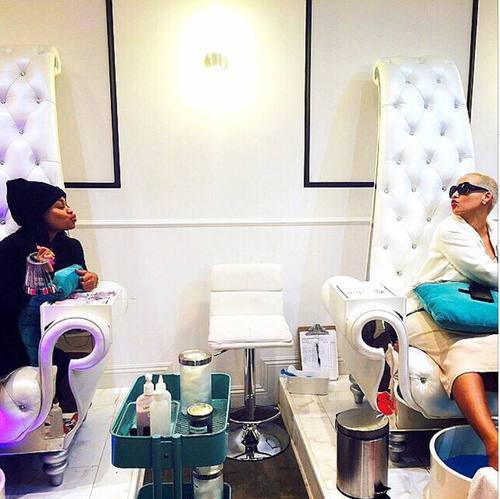
Though not necessarily Amber's place to speak on the subject, though she is best friends with Blac Chyna, her original intention seemed to be to 1) address the fact that a 25-year-old man may be taking advantage of the naiveté of a 17-year-old girl of controversial, albeit financially successful, background, and 2) assert that Kylie Jenner should enjoy the teenage years that Amber had to leave behind too soon.
The situation would almost certainly be different if the Kardashian family was poor. Despite Kim's tendency to date African-American men in the music and sports industries, one could hardly imagine that they would let their white teenage daughter spend so much time with a grown black man without legal interference. Oftentimes in history, this has led to the imprisonment and death of black men, even when consensual or under false accusations. In this case, both Kylie and Tyga are financially sound, so they will likely escape legal consequences as long as their relationship seems inappropriate rather than criminal during this time.
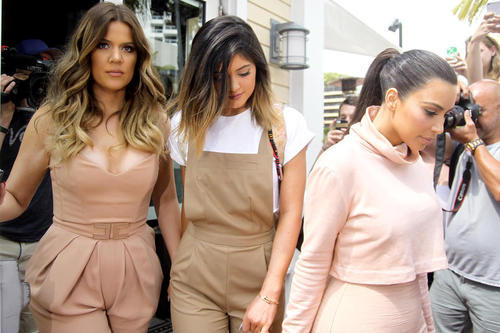
Another strong example, though not mentioned in the feud, is the fact that unmarried Kourtney Kardashian and Scott Disick have three children together, all of which have received magazine covers and designer gifts, whereas many people in the same situation would be labeled "baby mamas" and "welfare queens," both of which carry specific connotations of race and class in our society.
The Kardashian family continues to be a cultural force to be reckoned with. Their success has largely determined what is socially acceptable, profitable, and legal in America when you are rich and famous. The circumstances that they are able to publicize and capitalize on are ones that the average family would suffer severe consequences from due to the two factors discussed here.
As for Khloe and Amber, who are both currently in divorce proceedings and working to build their own respective brands, here's hoping that they bury the hatchet and find success. As for Kim, well, Kanye has her covered. And as for Kylie and Tyga, only time will tell. Specifically August, when Kylie turns 18.
#kim kardashian#khloe kardashian#kylie jenner#amber rose#racism#classism#double standards#slut shaming#sexuality
2 notes
·
View notes
Text
Policing Beauty: When Booty is a Crime
On Thursday Nicki Minaj released the cover art for her newest single Anaconda, in which she wears a sports bra, G-string, and Jordans. She immediately started trending on social media, with many people calling the artwork inappropriate. However, as she pointed out on her Instagram account, Sports Illustrated models in thong bikinis, posed to similarly display their buttocks on the cover of easily accessible magazines, have been accepted and even praised as part of sports entertainment for years. While media has accepted the near-nudity of white models, Minaj, dubbed "Black Barbie" for her equally well-known backside, is being critiqued for the same imagery.
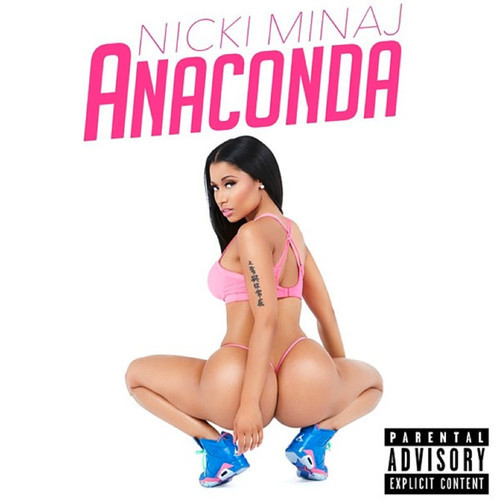
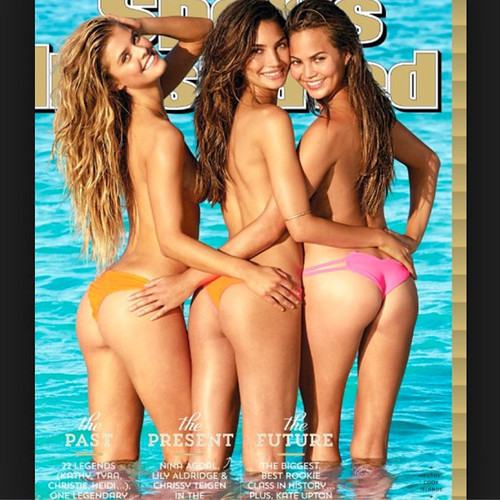
There is no doubt that the bodies of women have been policed for centuries regarding the acceptability of what they can and can't show, but the comparison of Minaj to swimsuit models brings attention to the intersectionality of race and gender in this matter. Minaj is not only a woman, but a black woman with a famously large derriere in comparison to many of her white counterparts in the entertainment industry, which is partly why the uproar has ensued. This speaks first to the fact that women who are more curvaceous than the Hollywood standard are not accepted in certain depictions of beauty. Secondly, it raises the issue that women who belong to racial or ethnic groups that celebrate curves have an even smaller representation in media, and trouble brews when that beauty is shared with a predominantly white audience.
Even a brief glance through history reveals the complex treatment given to black women over their bodies. In the early 1800s, Sarah Baartman was abducted from South Africa and sold in London, where she was placed on display at a "freak show" for Europeans who would pay to see her large butt. She was dubbed "Hottentot Venus" for her appearance, which, though natural to her, was different and therefore exotic to Europeans. Ironically, while Europeans exploited Baartman's features as a spectacle to behold, they also thought her to be wild because of them, as if her body somehow made her sexuality inherently more animalistic.
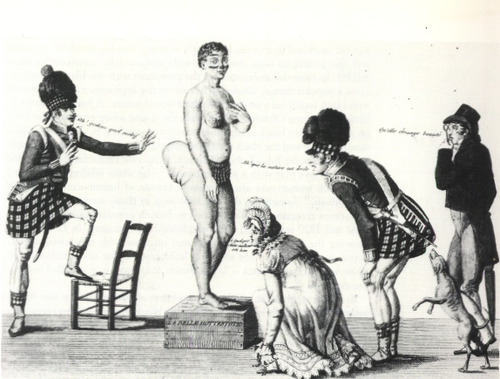
Here lies one of the oldest designations of Eurocentric beauty as normal and the beauty of other ethnic groups as abnormal. Furthermore, it speaks to the sexual politics regarding women's bodies. When exactly the notion that larger breasts and buttocks meant increased sexuality in a woman's nature was formed is unknown, but it is one that has prevailed throughout history and permeated today's entertainment.
In the '90s, Tyra Banks made waves as the first African-American woman to ever be featured on the cover of magazines GQ, Sports Illustrated Swimsuit Edition, and Victoria's Secret. This was significant not only because of her race, but because of her body type. Banks was also considered to be much more curvaceous than other models at that time, and has since encouraged the acceptance of curves in all of her endeavors, including pushing the "booty tooch" for contestants on America's Next Top Model.
We now live in a time in which Beyonce has made "bootylicious" a compliment, Jennifer Lopez is twerking in celebration of curves, Meghan Trainor claims to be "bringing booty back," and Kim Kardashian is called hot for her selfies. However, the entertainment industry is still struggling to accept women's beauty in different sizes, particularly women with a lot of junk in the trunk. Eurocentric beauty norms are advertised nationwide in America, and beauty celebrated outside of that is almost considered part of a counterculture. What progress society and the entertainment industry will make is unknown, but there is hope for the future as women continue to exert their agency by releasing imagery and music celebrating their curves.
7 notes
·
View notes